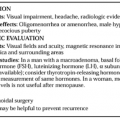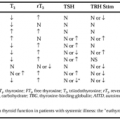PROGNOSTIC IMPLICATIONS AND ROLE OF THYROID HORMONE THERAPY
In critically ill patients, a strong correlation has been found between the serum T4 level at the time of hospital admission and the mortality rate. Given that the magnitude of depression in thyroid hormones corresponds to the severity of the underlying NTI, the fact that patients who have the greatest thyroid hormone depression have the worst prognosis is not unexpected. A particularly high mortality rate has been noted in critically ill patients with levels of serum T4 and TSH that remain depressed for >1 week after admission to hospital.5 The serum T4 depression correlates negatively with survival in a manner that parallels the traditional Acute Physiology and Chronic Health Evaluation II (APACHE-II) prognostic score. Critically ill elderly patients with high serum IL-6 values and low serum albumin levels are more likely to have NTI-related thyroid alterations and have a higher likelihood of dying from their acute illness.71
Stay updated, free articles. Join our Telegram channel

Full access? Get Clinical Tree





